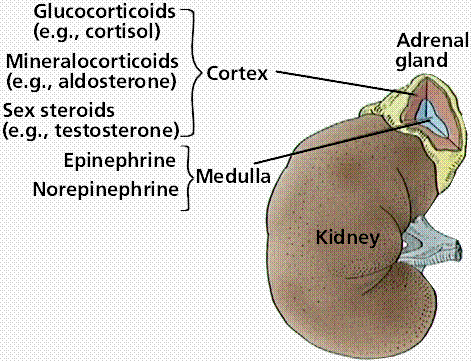
The “fight or flight” syndrome – you’ve heard of it, right? Accompanied with the image of the saber-toothed tiger dashing after a hunter, getting ready to attack. You often get into this situation, don’t you? In modern times, we’re not literally in that frantic position, but our bodies are often reacting as if we were fighting for our lives. Our adrenal glands, located on top of each kidney, are forced to work overtime in an effort to deal with stress from all sources: injury, disease, work, family, finances, environment, etc.
What Adrenals Do
It’s hard to imagine these small endocrine glands, essentially the size of a walnut, responsible for the manufacture and secretion of vital hormones such as cortisol, estrogen and testosterone. The cortisol production is crucial for the body to combat stress. Whereas thousands of years ago the stress was a finite amount of time – you either outran the predator or survived or you were eaten – nowadays, stress seems to be a state of being for so many people.
Although not getting along with a boss or missing a bill payment are not life-threatening like the saber-toothed tiger, our bodies react to the stressors in a similar fashion. The body starts to feel unsettled. More and more cortisol is produced because the body believes it needs massive amounts of energy to run for its life. This happens over and over again throughout the day: getting the kids ready for school and getting yourself ready for work, traffic, spilling coffee on your new suit, your assistant calls in sick and you’ve got to send out 20 packages today, the babysitter is late picking up the kids from school and taking them to soccer practice, your late afternoon meeting runs over and you leave the office late so family dinner becomes you eating leftovers alone. And all this is going to happen again tomorrow!

The Warning
Here’s the problem: chronic stress can overload the adrenal glands to the point of exhaustion. For some, the fatigue will become overwhelming and the adrenals will no longer function properly to provide the energy and resources the body needs on a day-to-day basis. When someone is exhausted, a natural suggestion is to get more sleep. That’s not always easy with adrenal problems because insomnia is a common symptom. There are, however, steps you can take to prepare yourself for sleep, which is certainly one of the best ways to refresh and rejuvenate your body, mind and spirit.
Set a Sleep Routine
For better sleep and to heal your adrenal glands:
- Go to bed at the same time every night between 10-10:30pm.
- Avoid stimulants such as caffeine and sugar in late afternoon/evening (or remove them completely from your diet to avoid any rollercoaster-like blood sugar surges).
- Keep a gratitude journal near your bedside. Every night, list five things for which you are grateful. Remind yourself that even though you may feel fatigued, there are wonderful aspects of your life and many reasons to heal.
How is your energy level throughout the day? Do you wake up feeling tired? Give your adrenals some love and they will love you right back. Take care of yourself, please. I’m here to support you be your most vibrant self! 😉
Leave a Reply